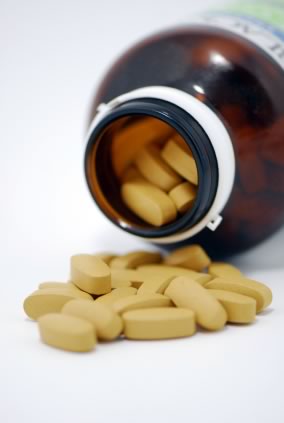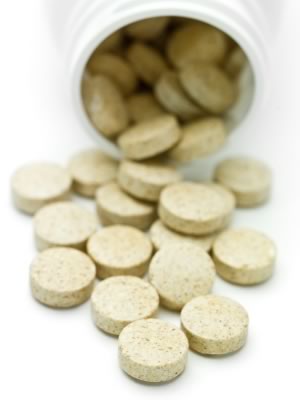Everything you Need to Know About Biotin
Biotin is also known as vitamin B7, but you might hear it referred to as Coenzyme R, D-Biotin, W Factor, and Vitamin H. It is a water soluble B vitamin and is used in many different ways within the body but is essential for all people. For instance, during pregnancy this vitamin is thought to be beneficial in the proper formation of the fetus and to help prevent birth defects.
It is also thought that Biotin can be used to prevent rapid weight loss, as well as to help prevent malnutrition which can often occur with any type of tube feeding. It is most commonly used to help supplement and prevent brittle nails, thinning hair and skin problems and has also been used to treat mild forms of depression.

It is also thought that Biotin can help to reduce blood glucose levels in people with type 2 diabetes and can even help with certain digestive problems, such as Crohn’s disease.
Early Study Results
Preliminary studies have found that Biotin can help to reduce insulin resistance and improve overall glucose tolerance. Some studies suggest that vitamin B7 can be an effective treatment for everything from cancer, to hair loss, to Parkinson’s disease and certain types of dermatitis, to other neurological problems.
It is thought that since a deficiency in Biotin can be a contributing factor in whether a person suffers from these conditions, it can be helpful in treating them.
Like other essential B vitamins, Biotin can help to increase a person’s energy levels and improves the way the body metabolizes the food that people eat. Biotin helps the digestive system to properly break down and use all of the carbohydrates and fats that people consume, whether bad or good, so it is an essential enzyme in the body.
B7? Get Remedies Fast!
While it is generally easy to get plenty of it in the foods most people eat daily, a lack of it can wreak havoc on the body. There are even some studies which suggest that a person who has a prolonged Biotin deficiency can be at risk for developing Type 2 Diabetes, as well as digestive disorders and problems with the nervous system.
How it’s Used
Biotin, or vitamin B7 aids in the proper break down of fats and carbohydrates. It provides the digestive system with essential enzymes and when a person has a Biotin deficiency, it is thought that they cannot properly break down and use the essential benefits that come from fats and carbs, such as energy and the healthy hair, skin and nail benefits that many good fats provide to the body.
The inability to properly break down these nutrients may cause a lack of energy and inhibit the ability for parts of the body such as hair and nails to stay strong. In addition to the hair, nails and skin suffering when a person is deficient in vitamin B7, the nervous system and digestive system can also wind up with problems due to not having enough of this nutrient. Some health care professionals are even suggesting that not having enough Biotin in the body can lead to heart problems, since healthy fats help the cardiovascular system.
Biotin is often used in cases where a person might be suffering from a deficiency of the nutrient, but since there are no tests to definitely determine that a person is lacking in this essential vitamin, usually symptoms are used as a guideline in diagnosing this problem. Symptoms that a person might be lacking Biotin often include hair loss and color of hair, hair breakage, red, scaly rash around the nose and mouth, mild depression, feeling lethargic, brittle nails and sore muscles, as well as intestinal disorders or problems with the nervous system, such as tingling limbs.
How common is Biotin Deficiency?
Diagnosable Biotin deficiency is fairly rare, but that doesn’t mean you couldn’t use a little bit more in your diet. It is thought that an average healthy person who maintains a healthy diet won’t be too at risk of a deficiency, since it is found in a wide variety of foods, however, if a person is dieting to extremes, is on a feeding tube or is pregnant, the need for this nutrient might be greater. High levels of panthothenic acid and certain anti-seizure medications can also affect the levels of Biotin in the body. It is also thought that smoking can deplete a person of Bitoin. These are all factors that can contribut to the body not getting the nutrition it needs from food due to extrenal factors and can contribute to a person’s lack of vitamin B7.
As people age they need more Biotin in their bodies due to the way that more of it is required to help their bodies properly digest the many carbohydrates and fats we consume. This includes good fats, such as Omega-3’s and complex carbohydrates, which have excellent benefits for the whole body. In addition to age, it is thought that if a person eats egg whites for long periods of time, takes oral antibioitcs for extended periods or takes certain other medications might also be at risk for this condition.
How Can People Get Enough of It?
In addition to taking Biotin supplements, a person can ensure that they get enough B7 in their diet by eating less processed foods and focusing on maintaining an overall healthy, well rounded diet. Whole, unprocessed veggies, whole grains and egg yolks are rich sources for this vitamin, as well as foods such as chicken, cheese, fish, nuts, pork, potatoes, spinach and legumes. A good rule of thumb when eating to maintain Biotin levels is to avoid processed foods, as they tend to be lacking in this essential vitamin.
You may also find that a good B vitamin complex which includes Thiamine, B12 and Riboflavin also contains a high amount of vitamin B7 to meet your general needs. It’s a good idea to check for Biotin in your daily multivitamin and if you take a B complex vitamin, it will likely be in there, as well. This can help to ensure that a person is getting plenty of this nutrient, especially if they have any of the risk factors of being deficient in it.
Is it safe?
It is generally thought that Biotin is safe for most people when used as directed. Most often, this supplement is taken orally. In fact, pregnant and breast feeding women might also be able to take this supplement as well, but should check with their health care provider before doing so. It is also thought that people who are recieving kidney dialysis should consider taking this vitamin, as they may be deficient in it. Also, if you feel that you may be in a high risk group for developing a deficiency of B7 or you just want to ensure that you get enough of this essential nutrient, you will likely find that you get plenty of it in your diet and with the use of supplements which you can take.

There is no data to suggest that Biotin will prove toxic when too much is taken, however, it is thought that since this is a water soluble vitamin, there aren’t really negative side effects from taking or consuming too much of this nutrient.
When vitamins are water soluble it means that the unused portions of the vitamin are flushed from the body as waste daily, and this can dramatically increase the overall safety of Biotin.
Despite the safety of this vitamin, it is always recommended that people not exceed the daily recommended dosage by too much unless recommended by a physician.
Other facts
While it is known that the body needs Biotin to properly break down fats and carbohydrates, there really isn’t much known on the subject. It is thought to be generally safe when taken orally and according to the directions, and preliminary studies suggest that this is a nutrient which is very well utilized within the body.
However, there are no studies that clearly find that it will be beneficial in helping to prevent or repair thinning hair and brittle nails, which is one of the more common uses of this nutrient. There is also no research that clearly finds that it is not beneficial in these, or other areas.
Current studies do offer some guidelines on how much people of all ages should have. For instance, infants and small children generally don’t need more than 8 micrograms per day and infants younger than seven months have the lowest need at 5 micrograms daily. Adult men and women who are 70 or older require much more of this nutrient and should have as much as 30 micrograms daily.
Although much of this higher dosage can be obtained from food, it may be necessary to take supplements of some kind to ensure a person is getting enough and some health care professionals will recommend more, depending on your individual needs and symptoms. If you think you might be suffering from a Biotin deficiency, you may want to seek the advice of your health care provider.
Sources:

1 Comment
Thank you so very much for your information on Biotin. It is well covered.
I had trouble with depression – anxiety and after having my third child, I also went through a time of depression, nervousness, and anxiety, which is normally unusual for me. I thought I could “handle anything”. A wise doctor in Canada told me that “this is all because your body is out of balance” – it’s NOT YOU
He put me onto: Biotin, Folic Acid and Vitamin C – a lot of Vitamin C.
Within 4-5 days I started regaining mental strength and the anxiety subsided.
If I take anything that has Aspartame or Sucralose in it, the nervousness returns, and the anxiety starts. So, I DROP THE INGREDIENT and increase my Biotin, Folic Acid, and Vitamin C. The anxiety goes away.
We must get good levels of Biotin and Folic Acid in our bodies. Fear and Anxiety and depression with the lack of these can really disrupt and ruin our precious days, Even get people to the point of wringing their hands and get to the “Oh God, Oh No! stage. It is horrible and so scary.
I’m normally a strong, easy going, like to help others type of person and college educated. I just say to others: It’s NOT YOU. Take supplements to get you body back “into order:.!